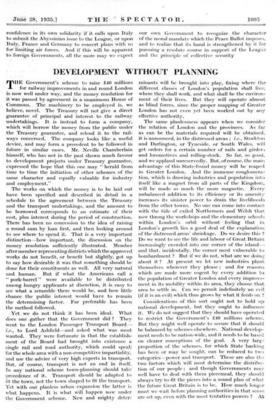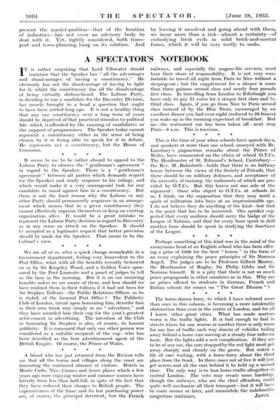DEVELOPMENT WITHOUT PLANNING
THE • Government's scheme to raise £40 millions for railway improvements in and round London is now well under way, and the money resolution for it was passed by agreement in a unanimous House of Commons. The machinery to be employed is, we believe, novel. The Treasury will not give a direct guarantee of principal and interest to the railway undertakings. It is instead to form a company, which will borrow the money from the public under the Treasury guarantee, and relend it to the rail- ways concerned. The company looks like a useful device, and may form a precedent to be followed in future in similar cases. Mr. Neville Chamberlain himself, who has not in the past shown much favour to• development projects under Treasury guarantee, expressed the hope that this one may " herald from time to time the initiation of other schemes of the same character and equally valuable for industry and employment."
The works on which the money is to be laid out have heen specified and described in detail in a schedule to the agreement between the Treasury and the transport undertakings, and the amount to be borrowed corresponds to an estimate of their cost, plus interest during the period of construction. There has been no concession to the idea of raising a round sum by loan first, and then looking around to see where to spend it. That is a very important distinction—how important, the discussion on the money resolution sufficiently illustrated. Member after member representing districts which the approved works do not benefit, or benefit but slightly, got up to say how. desirable it was that something should be done for their constituents as well. All very natural and human. But if what the Americans call a pork-barrel " were available to be distributed among hungry applicants at discretion, it is easy to see what a scramble there would be, and how little chance • the public interest would have to remain the determining factor. Far preferable has been the method followed.
Yet we do not think it has been ideal. What does one gather that the Government did ? They went to the London Passenger Transport Board- i.e., to Lord Ashfield—and asked what was most wanted. They were fortunate in that the establish- ment of the Board had brought into existence a single rail and road authority, which could speak for the whole area with a non-competitive impartiality, and use the =advice of very high experts in transport. But, of course, transport is not an end in itself. In any national scheme town-planning should take precedence of it. Transport should be adapted to fit the town, not the' town shaped to fit the transport: Yet with our planless urban expansion the latter is what happens. It is what will happen now under the' Government scheme. Nevi and mighty deter= minants will be brought into play, fixing where the different classes of London's population shall live, where they shall work, and what shall be the environ- ment of their lives. But they will operate almost as blind forces, since the proper mapping of Greater London has not even yet been worked out by any effective authority.
The same planlessness appears when we consider the relation of London and the provinces. As far as can be the materials required will be obtained, it is announced, in the distressed areas ; i.e., Stockton and Darlington, or Tyneside, or South Wales, will get orders for a certain number of rails and girders and locomotives and rolling-stock. So far, so good, and we applaud unreservedly. But, of course, the main advantage of this State-found money will be reaped in Greater London. And the immense conglomera- tion, which is drawing industries and population into itself like a magnet from all parts of the Kingdom, will be made so much the more magnetic. _Every unbalanced addition to its efficiency or its amenity increases its sinister power to drain the livelihoods from the other towns. No one can come into contact with the tide of exiled Northerners and Welsh that now throng the workshops and the elementary schools within London's orbit without feeling that in London's growth lies a good deal of the explanation of the distressed areas' shrinkage. Do we desire this ? Do we want to see the life and labour of Great Britain increasingly crowded into one corner of the island— and that, incidentally, the corner most vulnerable to bombardment ? But if we do not, what are we doing about it ? At present we let new industries plant themselves wherever they please ; and for reasons which are made more cogent by every addition to the population of Greater London and every improve- ment in its mobility within its area, they choose that area to settle in. Can we permit indefinitely an evil (if it is an evil) which thus grows by what it feeds on ?
Considerations of this sort ought not to hold up national development, but they ought to influence it. We do not suggest that they should have operated to restrict the Government's £40 millions scheme. But they might well operate to secure that it should be balanced by schemes elsewhere. National develop- ment needs to be nation-wide, and it needs to be based on clearer conceptions of the goal. A very larg3 proportion of the schemes, for which State backing has been or may be sought, can be reduced to two categories—power and transport. These are also the two factors which will most determine the distribu- tion of our people ; and though Governments may well have to deal with them piecemeal, they should always try -to 'fit the pieces into a sound plan of what the future Great Britain is to be. How much longer must we wait before planning authorities in that sense are set up, even with the most tentative powers ? At
present the master-problem—that of the location of industries—has not even an advisory body to deal with it. Yet, rightly considered, both trans- port and town-planning hang on its solution. And
by leaving it unsolved and going ahead with them!, we incur more than a risk—almost a certainty—of embodying fresh evils in solid brick-and-mortar forms, which it will be very costly to undo.







































 Previous page
Previous page